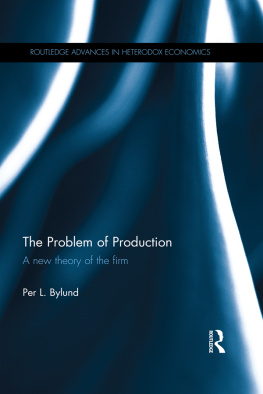First published 2000 by Ashgate Publishing
Reissued 2018 by Routledge
2 Park Square, Milton Park, Abingdon, Oxon OX14 4RN
711 Third Avenue, New York, NY 10017, USA
Routledge is an imprint of the Taylor & Francis Group, an informa business
Copyright Denise Thursfield 2000
All rights reserved. No part of this book may be reprinted or reproduced or utilised in any form or by any electronic, mechanical, or other means, now known or hereafter invented, including photocopying and recording, or in any information storage or retrieval system, without permission in writing from the publishers.
Notice:
Product or corporate names may be trademarks or registered trademarks, and are used only for identification and explanation without intent to infringe.
Publishers Note
The publisher has gone to great lengths to ensure the quality of this reprint but points out that some imperfections in the original copies may be apparent.
Disclaimer
The publisher has made every effort to trace copyright holders and welcomes correspondence from those they have been unable to contact.
A Library of Congress record exists under LC control number: 00134828
ISBN 13: 978-1-138-74670-1 (hbk)
ISBN 13: 978-1-315-18271-1 (ebk)
Since the publication of 'Labor and Monopoly Capital' (Braverman 1974), the issue of skill has been the subject of a considerable amount of sociological debate. These debates focus on a range of issues. Sociologists have attempted to define the nature of skill (Braverman 1974, Cooley 1987, Spenner 1990, Attewell 1990, Scarbrough and Corbett 1992), to chart changes in aggregate skill levels overtime (Penn 1994, Gallie 1996), to show how, especially from a feminist perspective, definitions of skill are socially constructed and related to the power of groups to define their work as skilled (Dex 1988, Bradley 1989, Steinberg 1990, Wajcman 1991, Coyle 1992, England 1992) and to identify the relationship between technology and skill (Kelley 1989, Lane 1988, Hendry 1990, Scarbrough and Corbett 1992). Little attention has been given, however, to the subjective perceptions of skill held by those directly involved in production. Nor has research been undertaken to explore the ways in which the perceptions of skill held by managers and workers are developed and maintained. Thus, the subjective perceptions of skill held by managers and workers are a neglected area in the sociology of skill. This book aims to redress the general neglect of manager and worker perceptions of skill through the presentation of empirical evidence from three case study organisations. This evidence is used to construct a model through which to explain subjective perceptions of skill and the causal processes that shape them. This approach serves to shift analysis away from definitions of skill constructed by sociologists towards a theory of skill that is grounded in the subjective definitions of those directly involved in production.
Further issues dealt with in the book are as follows. First, it explores the extent to which the causal processes identified as shaping subjective perceptions of skill are explicable in the context of existing theories. Second, perceptions of skill are examined and explained in the context of an alleged shift between Fordist and post-Fordist production paradigms. Third, management and worker perceptions of skill are related back to the wider capitalist system. Finally, comparison is made between workers and managers' perceptions of skill, and sociological definitions of skill. I shall show that managers' and workers' perceptions are more narrowly defined and context dependent than the definitions applied by sociologists. I also show that the causal processes that shape subjective perceptions of skill occur on a variety of levels. That is, at the level of the capitalist structure itself, at the level of organisational structures, and at the level of individual agency. Examination of the above issues is conducted through empirical research in three case study factories, and a description of each factory will be given later in the chapter.
In addition to perceptions of skill, the second theme of the book concerns the perceptions of core and periphery held by workers in two of the three case study factories. The concept of core and periphery was put forward by Atkinson (1984) in his model of the flexible firm, and purports to describe a division between core workers with permanent employment contracts and peripheral workers with non-standard part-time and temporary contracts. This analysis of perceptions of core and periphery aims to explore how the perceptions of workers, whose formal contract of employment could be defined as peripheral, compare with theoretical conceptualisations of the periphery. A further issue, and one that links skill, and core and periphery, is the implicit assumption in Atkinson's model that core workers are more highly skilled than allegedly peripheral workers. I will show that neither workforce skills nor workers' perceptions of skill are patterned around different types of employment contract. I will also show that part-time and temporary workers do not perceive themselves as forming part of a peripheral labour force.
The remainder of this introductory chapter is concerned with delineating the contours of the book. This begins with an an outline of the theories that have informed the construction of a general model to explain perceptions of skill, core and periphery, and an explanation of their relevance. This is followed by a brief description of the realist social theory that underpinned the research and writing of this book, and a short, preliminary description of the three case study firms. The chapter then provides a brief outline of the proposed model before ending with an outline of each subsequent chapter.
The Theoretical Background
The construction of the model to explain subjective perceptions of skill, and the causal processes that shape them, draws on a variety of theories. These theories are discussed in detail in the discussion focuses on labour process theory and theories of post-Fordism. The applicability of these two broad perspectives to the study of subjective perceptions of skill, core and periphery concerns a number of issues. First, it is from within the labour process and post-Fordist perspectives that the subject of skill has been most widely debated. Second, both perspectives are concerned with explaining processes that have a generative influence on skill formation. For labour process theorists, the main question concerning skill is that of whether the labour process under monopoly capitalism has led to a general deskilling of the workforce. It is argued by Braverman and his supporters that the articulation of Taylorist management strategies and technology serve to separate the conception and execution of work, and that this results in a deskilling of the workforce. It is beyond the scope of this book to examine the extent to which Taylorism remains a feature of industry in general or to consider the deskilling thesis. What I do intend to argue is that in the three case study factories Taylorist or neo-Taylorist managerial strategies prevail. These strategies combine with various forms of technology to generate jobs that are characterised by a deep division between conception and execution of tasks. The outcome in terms of perceptions of skill are perceptions that emphasise practical task related competencies, but which exclude any theoretical understanding of specific production processes. The book also shows, however, that the developments set out by Braverman do not apply to all workers in the three factories. For a small group of workers the separation between conception and execution is less marked, and perceptions of skill are, as a result, less tied to practical task competencies. Thus, the relevance of labour process theory to this book concerns the ways in which Taylorist managerial strategies combine with technology to produce a division between conception and execution of tasks, and the implications of this division on the subjective perceptions of skill held by some workers.








